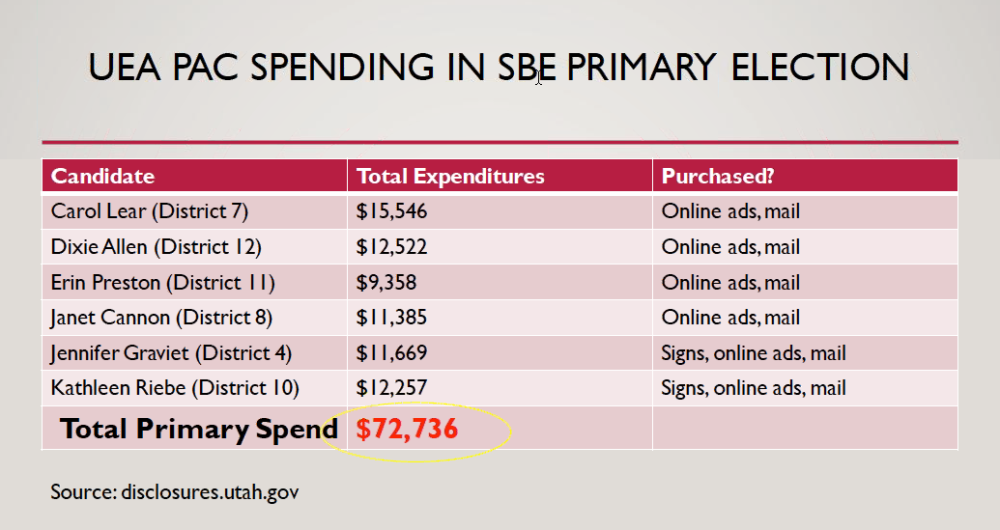Senate President Niederhauser and House Speaker Hughes
The State School Board race has never drawn much attention before. But this year, the Salt Lake Tribune reported, businesses and even top-tier elected officials are personally campaigning and fundraising for and against certain candidates.
Yesterday’s headline was: “Niederhauser and Hughes ask Business Leaders to Help Defeat UEA-Backed School Board Candidates“. Yesterday, too, business organizations such as the Utah Technology Council and the School Improvement Association joined Niederhauser and Hughes in a fundraising webinar that promoted a slate of pro-Common Core candidates who happen to be not favored by or funded by national teacher’s unions.
I understand why someone with a conscience would campaign against out-of-state big UEA-NEA money buying Utah’s state board election. So they should.
But I don’t understand why these groups have chosen to campaign against both the anti-Common Core candidates (in blue) as well as against the UEA-backed candidates (in red) as they showed in this slide at yesterday’s insider fundraising webinar:
Nor do I understand why our House Speaker and Senate President don’t see the hypocrisy in speaking against big money buying votes (NEA) while both of them are personally funded by big business money (Education First).
But my bigger questions are: how do the Speaker and the Senate President dare to campaign for Common Core candidates, thus going directly against Governor Herbert’s call to end Common Core alignment in Utah?
How do they dare campaign against the resolution of their own Utah Republican Party that called for the repeal of the Common Core Initiative?
Have they forgotten the reasons that their party is strongly opposed to all that the Common Core Initiative entails?
Have they forgotten Governor Herbert’s letter that called for an end to Common Core and SAGE testing just four months ago? (See letter here.) For all the talk about wanting to move toward local control and to move against the status quo, this seems odd.
Next to the governorship, there aren’t more powerful offices in the state than those held by House Speaker Hughes and Senate President Niederhauser. So what does this powerful endorsement of a certain slate of candidates signify?
First, it signifies what is probably a sincere concern for (partial) local control: In the fundraising webinar held yesterday (by Hughes, Niederhauser, the School Improvement Network and the Utah Technology Council) the following slide was displayed: Out of $308,512 raised for the political action of the Utah UEA (teacher’s union) $300,000 of it came from out of state. Hughes and Niederhauser are right in being alarmed at that money’s probable effect on local control.
(What they didn’t highlight is this: all of the anti-Common Core candidates’ funding, combined, doesn’t come close to what even one of the UEA-funded candidates are spending because none of them are backed by corporate or political powers.)
Secondly, it signifies Utah leadership’s alignment with Obama’s vision for education, which among other things mandates sidelining certain subjects in favor of others. Niederhauser told the Tribune that he didn’t want any board member’s vision to “dominate the board” which, to him, meant to “supplant business and technology representatives.” So he wants to make sure that business and technology is at least as dominant as any other interest. The School Improvement Network is of the same opinion.
We could ask why. Why, specifically, would legislators be endorsing the fields of business and technology over the fields of languages, medicine, history, social work, the arts or any other thing? And where’s the idealogical division between what NEA wants and what Niederhauser-Hughes want? Is it fair to speculate that NEA corporate funders are in competition against the Education First corporate funders, and all of this is just an economic struggle pretending to be a struggle for the children’s best interests? Utah tax dollars are, after all, the passionate pursuit of multiple players in the now $2 Billion per year ed tech sales industry.
Many people know that both Hughes and Niederhauser’s political campaigns are heavily funded by Education First, a Utah political action committee for Prosperity 2020 that puts businesses first.
Not voters first. Not education –broadly– first; this is education as defined by the ed-tech sales industry and by Obama’s 2020 vision. Read it in their own words. In an Tribune op-ed taking credit for passing legislation that Education First had lobbied for, you’ll see little focus on funding for paper and pens, school basketballs, violins, gluesticks, old-fashioned books, or heaven forbid, large teachers’ salaries– no, ed funding to Education First means to fund the priorities that precisely (coincidentally?) match Obama’s 2020 vision: early childhood education (which competes with free enterprise/private preschools), workforce development (China-styled central planning) “community schools” (Obama’s vision to integrate healthcare with academics and with socio-political movements “using government schools as a hub”) and standardized personalized learning (an oxymoron that cements Common Core academics and its data tags).
Don’t mistake this as a fight between tech lovers and tech haters. None of the candidates for state school board are anti-technology, though the smart ones are pushing for improved laws governing student privacy in this modern age.
So what are Hughes and Niederhauser really saying when they say they’re for the pro-tech candidates? What does that really mean? That Utahns should sit back and let the ed tech sales industry, or businesses, sit in the driver’s seat for educational decision-making? That’s the stated aim of Education First (in Utah) and of Obama’s 2020 (nationally) and, according to his Tribune quote above, it’s also the aim of President Niederhauser.
Education First doggedly, directly, lobbies citizens, governments, and school districts, to strong-arm their narrow vision, that businesses should “help” direct education. They refer to my child and yours as the economy’s. They call children “human capital” on their website. This is, when ripe, the 1992 Hillary-Tucker dream coming true, with the collective economy dictating to the individual on the assembly line.
Education First wants a high “concentration of science and engineering occupations” in Utah, which you may or may not agree with; what I hope you do agree with is that this new, business – public ed partnershipping governance system, with business being handed power to influence schooling, when taken to the extreme, is fascism. In fascism, there’s no distinction between government and business. And the voter has no say.
Do we want to walk down that slippery slope? Do we want the Education First business community to be given power in schools?
Whether promoting science and engineering at the expense of other subject and careers is the will of the people, or not, really doesn’t come in to the discussion. Prosperity 2020 has said that businesses will “provide a business oriented plan to improve results” for schools.
If Hughes or Niederhauser would respond to my emails to them, I would ask them this: how is it any more helpful toward Constitutional local control– if that is what you really want– to let businesses take over the driver’s seat for educators, as your financial backers aim to do, than for out of state (NEA) funding to call the same shots? Either way, students and schools and voters lose personal freedoms to self-appointed experts who think they know best.
So when Niederhauser worries that “big money groups effectively buy the election,” he is right. The hundreds of thousands of dollars pouring in to NEA-UEA approved candidates’ purses should raise eyebrows. But shouldn’t the same eyebrows rise too, seeing in-state big money groups like Education First and Prosperity 2020 now, as in the past, funding the pro-Common Core candidates –and funding Hughes and Niederhauser themselves– effectively buying the election in the very same way?
Meanwhile, none of the liberty-first, anti-Common Core candidates, Alisa Ellis, Lisa Cummins, Michelle Boulter or Dr. Gary Thompson, are richly funded. All they really have to stand on is true principles of liberty –and word of mouth.
Many voters know that Common Core is anti-local control. The Governor almost lost in the primary to anti-Common Core challenger Jonathan Johnson because of this. The Governor was repeatedly booed at political conventions this year because he had been such a promoter of the Common Core, prior to his turnaround. What will the governor say about Niederhauser’s and Hughes’ current effort? More importantly, what will voters say?
Dr. Gary Thompson, a district 10 candidate for state school board, said today:
“I was pleased the that the Speaker of the House and Senator Neiderhauser identified who the “anti common core” education candidates are in this election. I was pleased to be labeled as one of them. This provides a clear choice for members in the community to chose from as they please. Comments made by the Speaker in regards to the UEA did not receive a prior endorsement by this campaign. I look forward to having a professional, cordial discussion with my UEA endorsed opponent on September 28th regarding education issues that will affect our children in District 10″
For anyone wanting to watch the debates between state school board candidates, please check that schedule here.
Pictured below are the candidates for state school board that I endorse, whom the UEA, NEA, UTC, SIN, Senate President and House Speaker do not:
For true local control of education:
Alisa Ellis, Michelle Boulter, Lisa Cummins, Dr. Gary Thompson.










